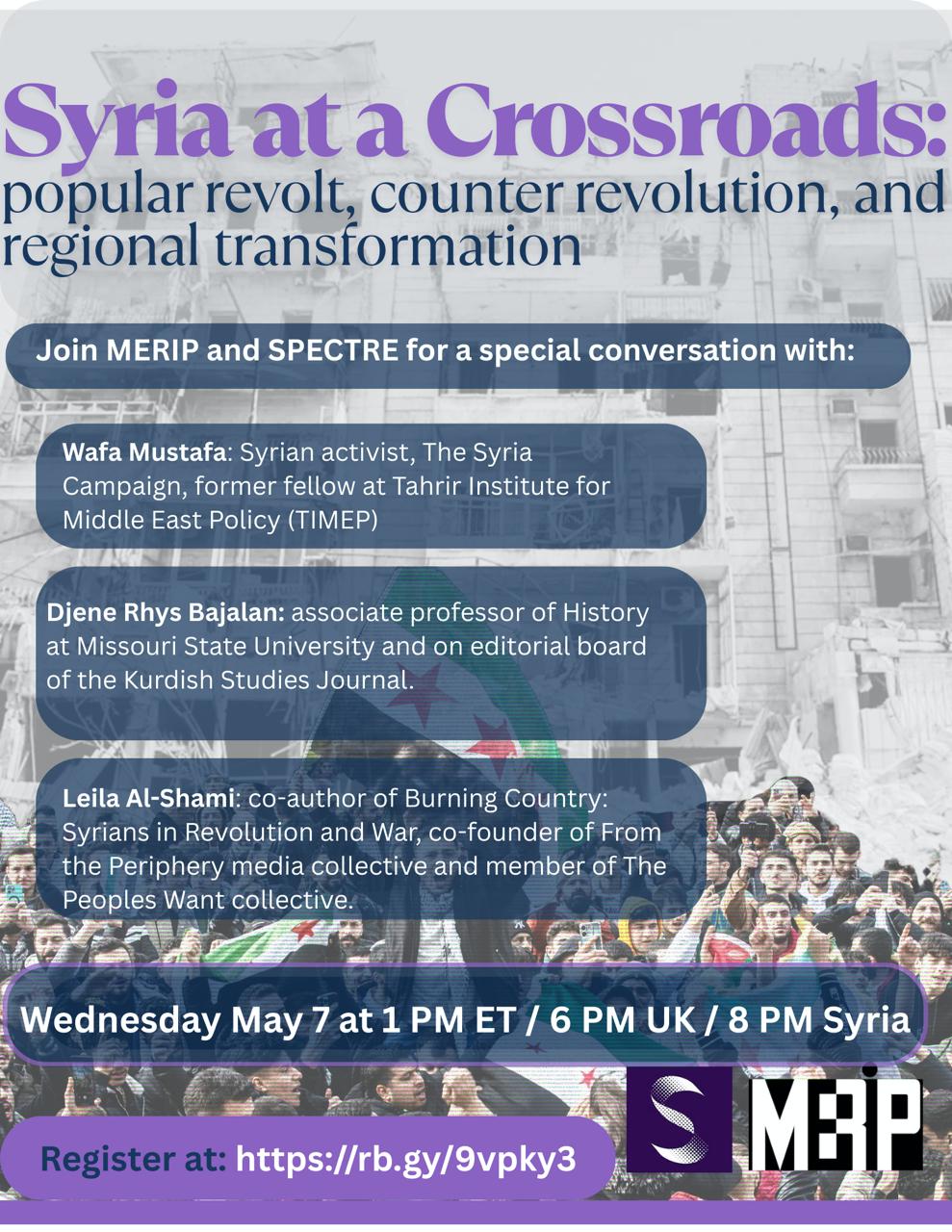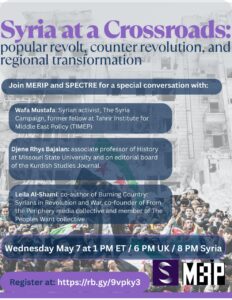
- This event has passed.
Syria at the Crossroads: Popular Revolt, Counterrevolution, and Regional Transformation
May 7 @ 1:00 pm - 2:30 pm

Join MERIP and SPECTRE for a special conversation series on the unfolding transition in Syria. Our kickoff conversation will be held on zoom May 7, 1PM EST, with further conversations to follow.
Speakers:
Leila al-Shami: co-author of Burning Country: Syrians in Revolution and War, co-founder of the From the Periphery Collective and member of The People’s Want.
Djene Rhys Bajalan: Associate Professor of History, Missouri State University, and editorial board member at the Kurdish Studies Journal.
Wafa Mustafa: Syrian activist, The Syria Campaign, former fellow at Tahrir Institute for Middle East Politics
This conversation will be co-moderated by Shireen Akram-Boshar (SPECTRE) and James Ryan (MERIP)
The events of December 2024 that ousted the regime of Bashar al-Asad in Syria and subsequently brought to power the Islamist Hayat Tahrir al-Sham has given rise to a set of critical questions for the left in the Middle East and beyond. Though HTS’s party politics are not universally shared, Ahmad al-Sharaa’s presidency would be impossible without support from broad sectors of Syrian society. How are we to understand the trajectory of a popular revolution as it unfolds with a leadership whose roots are clearly reactionary? What are revolutionary groups in Syria doing to press HTS to hold true to the core commitments of the 2011 Syrian uprising, to bring justice to the victims of the Assad regime, and to ensure that the tools of repression under Assad are not simply reallocated to a new dictatorship? As Syria prepares for a period of reconstruction, what can be done to avoid the pitfalls of neoliberalism and market logics that fractured Syrian society in the first place? How should we understand the dramatic realignment that seems to be occurring in Kurdish politics? Rojava, once at odds with HTS, has now agreed to let its militias integrate with the Syrian army, while its putative, imprisoned leader, Abdullah Öcalan has called for full disarmament. Conversely, Syria’s Alawite population has faced massacres and retribution lately – are these excesses of a regime in transition or a dark portent of retaliatory violence in the new regime? Regional politics likewise is at a moment of dramatic realignment – Turkey’s Erdoğan clearly feels triumphant, has positioned himself as the sponsor of the Syrian revolution, and is taking advantage of the moment to extract capitulations from Turkey’s Kurdish minority on the one hand, and brutally repress dissent and political opposition on the other, sparking the country’s largest protests since 2013. Israel has boldly expanded its occupation of the Golan Heights and expanded its campaign against Syrian sovereignty, seeking to ensure whatever shape the Syrian government takes, that it will be severely weakened militarily. Layered onto this complex situation, the other major geopolitical players in Syria over the past 14 years – the United States and Russia – seem to be on a path of convergence. Iran, too, seems on its back foot, but nonetheless holds a tremendous amount of Syrian debt.
All of this presents the left, in Syria and abroad, with a set of difficult contradictions to untangle – and untangling them feels more urgent than ever. In this series, MERIP and SPECTRE will bring together leading figures in the movement for popular sovereignty in Syria, analysts, researchers, and activists in the region and beyond to shed light on current developments and help audiences understand how these complex and contradictory positions can be navigated.

